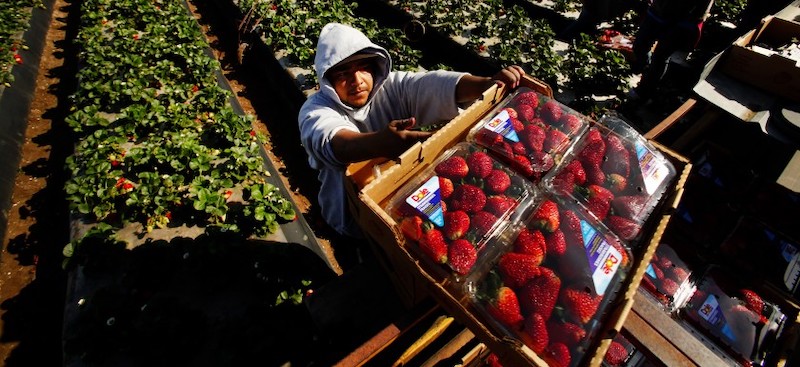The coronavirus pandemic and related economic shutdown is having a serious negative financial impact on farmers, ranchers and agricultural businesses in California.
That’s the conclusion of an economic study from Davis, California-based ERA Economic Consultants, which estimates that farms, ranches and related agribusinesses in the Golden State will lose between $5.9 billion and $8.6 billion this year. That’s serious pandemic pain.
The study, which was commissioned by a coalition led by the California Farm Bureau Federation and includes the California Fresh Fruit Association, California Tomato Growers Association, California Strawberry Association and other groups, found the state’s agricultural sector has already sustained losses of about $2 billion from disrupted markets like foodservice and rising production costs related to the coronavirus pandemic.
According to the report’s analysis, the financial impacts of the pandemic vary among different parts of the agricultural economy, depending on how much a particular crop or commodity relies on sales to the foodservice sector, which has been decimated since March, and how much it has been affected by shifts in retail demand and changes in costs of production and processing.
The retail supply chain was seriously disrupted from March to June and still hasn’t fully recovered. The foodservice sector has taken a huge hit with the economic shutdown. The closures of restaurants and schools, along with a huge drop in demand from other institutional customers, has caused a massive drop off in demand for many crops, forcing farmers to destroy crops destined for these markets.
The study looked closely at 15 different agricultural sectors, using data on production, exports and prices, along with conducting surveys of farmers and other agricultural businesses. The analysis found the greatest dollar-loss impact was in dairy, $1.4 billion to $2.3 billion; followed by grapes, $1.5 billion to $1.7 billion; and flowers and nurseries, $660 million to $740 million.
The study also found that farms, ranches and other agricultural businesses in California are incurring significantly higher operating costs from enacting new measures and practices designed to increase worker health and safety.
These costs are significant and their impact shouldn’t be underestimated. For example, the loss of the foodservice market has resulted in such significant added costs for some farmers that it’s quite possible many will never be able to recoup the losses.
The report points out that some crops, including shelf-stable items like rice, processed tomato products and canned fruit, have seen sales increases during the coronavirus pandemic, but concludes that the losses to farmers and the ag sector far outweigh the limited and isolated benefits.
The pandemic’s financial impact on farmers and agribusiness hasn’t been getting near-enough attention in Washington D.C or in the mainstream media.
Agriculture has been designated an essential industry, but federal funds have been slow to come for many farmers, particularly in California. Additionally, many growers don’t qualify for the funds, which are heavily-weighted to farmers who grow commodity-type crops rather than specialty crops, which the majority of farmers in California produce.
The financial loss to farmers has a ripple effect as well because most farm counties are rural counties. The economies in these counties and their cities are dependent on agriculture for their sustainability.
We’re seeing this reality played out in rural communities throughout the Central Valley right now, in fact. Small businesses are struggling, in part because of the struggles of farmers, and demand for emergency food assistance has increased by as much as 50 percent, according to the Second Harvest Food Bank Network in the region.
Covid-19 cases are soaring in California. Much of the economy has again been closed down and shelter-in-place orders reinstated. Demand in the foodservice sector remains low. Retail supply chain disruption has improved but is still causing problems for farmers and processors.
What this means for California agriculture is increased uncertainty. The pandemic is getting worse rather than better, and health experts are predicting this summer of bad could lead to an even worse situation in the fall.
California farmers feed much of the nation. The pandemic’s economic impact on the state’s farmers and agribusiness sector needs greater attention from President Trump, Congress and USDA. Here in California, the governor and state lawmakers need to make farming and agriculture a much higher priority. In most cases food and farming is an afterthought among leaders at the state capital.
Farming is a critical and essential industry in this time of coronavirus — and beyond. The pandemic’s economic impact on farmers is real and it is serious. If you eat, it involves you too.
We’re in unprecedented times and we shouldn’t take it for granted that farmers will simply keep on producing because it’s what they do. Remember, as food and farming goes, so goes the Golden State — and for that matter the nation. Imagine an America without food soverienty
[You can read The full report, Economic Impacts of the COVID-19 Pandemic on California Agriculture, at www.cfbf.com/covid-19-study]
MJDOA Magazine columnist and contributing editor Victor Martino is founder/CEO of Third Wave Strategies, a marketing, product development, sales and business development firm specializing in the food and agribusiness industries. You can contact him at [email protected].







